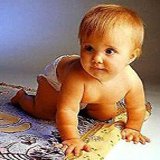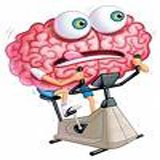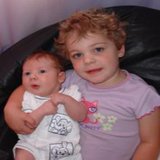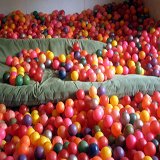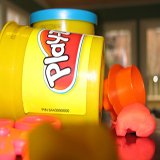Baby Development Milestones -
19 Month Old to 21 Month Old
Baby development milestones are often divided into specific domains, such as gross and fine motor movements, hand-eye coordination, language, cognition, social and emotional growth.
These designations are useful, but substantial overlap exists.
Studies have established average ages at which specific milestones are reached, as well as ranges of normality.
Here you will find detail of what to expect from your baby during the 19 month old development to 21 month old development phase.
Baby Development Milestones
19 - 21 month old
Fundamental Movement Skills
- Is able to undertake another activity while he is on the move. For example, he can trail a pull-along toy behind him as he walks.
- Likes to clamber over furniture.
- Climbs up and down from a chair.
- Improved balance and coordination leads to fewer instances of tripping over and unexpected falls when he is walking and running.
- Is able to use a wider range of outdoor play sets.
- Enjoys running freely in a park and in the garden.
Hand Eye Coordination
- Enjoys playing with modeling materials like play dough or clay, sand and water making shapes and drawing pictures into the surface.
- Likes rolling, throwing and perhaps even catching balls, both large and small, though he will find large ones easier to grasp.
- Stacks small wooden blocks on top of each other to make a tower of perhaps five bricks.
- Pours water accurately from one container into another one without too much splashing.
- Makes increasingly deliberate marks on paper with a crayon.
Language
- Has extended his vocabulary to dozens of words, mostly nouns that describe a general class of object such as car for all vehicles or house for all buildings.
- Tries to join in songs.
- Is interested in conversations and begins to learn conversational conventions, such as giving and waiting for answers.
- Puts words together to form two-word phrases.
- Develops an understanding that speech is about social contact as well as communicating basic needs.
- Spots familiar characters and objects in picture books and photographs and tries to name them.
Learning
- Begins to use toys to improve imagination and imaginative play, as a result of his developing capacity for symbolic thought.
- Increased problem solving exercises and ability enables him to complete a simple inset board and these toys are now well within his capacity.
- His developing curiosity makes him want to see what goes on outside and to explore closed cupboards.
- Uses all his senses, including sight, hearing and touch, to learn about the world in which he lives and becomes more confident in exploring new environments.
- Becomes more focused and determined and is more motivated to complete a challenging task.
Social and Emotional
- Appreciates your company and makes an effort to engage your attention either through talk or play.
- Can walk backwards a few steps.
- Shows that he is nearly ready to begin potty training, although full control is unlikely at this age.
- Persists in challenging decisions that he disagrees with.
- Begins to interact with other children but needs lot of basic social guidance.
- Is able to understand simple rules, although he may not always comply with them.
- Enjoys the security of a regular daily routine.
Expert Advice
This information is presented to help parents understand what to expect from their child at a certain age.
Any questions you may have about your baby development milestones should be shared with your family doctor.
Be sure to visit all the baby development milestones pages for different ages.
Find It!
Can't remember where you read something specific? Just type in your search term in the box below and your specific topic will be returned to you instantly.





